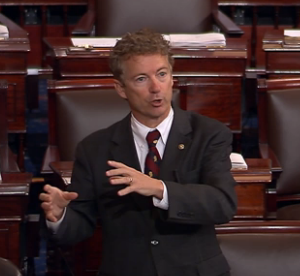For an alternative viewpoint, see “Counterpoint: The Filibuster Is Not the Problem.”
Close your eyes and let your imagination transport you back to the ninth-grade. Do you remember a teacher standing at the front of a classroom explaining the three branches of government? Division of power? Checks and balances?
Me too! But I’m increasingly concerned that many of our elected officials have no memory of basic high-school-level civics.
The House’s Congressional Progressive Caucus, which consists of nearly 100 representatives and Senator Bernie Sanders, recently released what it is calling an “Executive Action Agenda.” The agenda calls on President Biden to issue executive orders “lowering healthcare costs, canceling federal student loan debt, expanding worker power and raising wages, advancing immigrants’ rights, delivering on the promise of equal justice under law, combating the climate crisis and reducing fossil fuel dependence, investing in care economy jobs and standards, and regulating for economic and tax fairness.”
Those are stunningly huge issues for the president to be tackling unilaterally. According to my own ninth-grade civics teacher, only Congress can make laws.
It’s disturbing enough that over the last decade presidents have decided to bypass Congress and use their executive power to legislate. It is loads more disturbing to see members of Congress demanding that the president bypass them on major issues. Members of Congress should not be eager to surrender the institution over to the president. The term “danger to democracy” has become a cringeworthy cliché over the last few years, but it’s a perfect phrase to describe Congress encouraging the president to usurp their legislative authority.
How broken is Congress when its own members are trying to surrender to the executive branch? How did we get here? The answer is simple. The Senate’s legislative filibuster is to blame. Senators constantly defend the filibuster claiming that it encourages unity, bipartisanship and compromise, but take an honest look at the national mood and the current functionality of our government. Does it seem like unity, bipartisanship and compromise are winning the day in America thanks to the Senate?
What the legislative filibuster actually encourages is the opposite of its stated goals. It encourages partisanship, obstruction and political chicanery — tricks that lead to inferior legislation being passed or Congress being bypassed altogether.
Requiring a consensus of three-fifths of senators in order to pass simple legislation is anti-constitutional. The Constitution creates several supermajority requirements for the sole purpose of making things difficult. It requires two-thirds of senators to remove an impeached official from office, two-thirds from the House or Senate to expel one of their members, two-thirds of the Senate to approve a treaty, two-thirds of both houses to propose a constitutional amendment, three-fourths of states to ratify a constitutional amendment, and two-thirds of both houses to override a presidential veto. Those extraordinary thresholds are there to make those actions extremely difficult.
The framers chose not to place an extraordinary threshold on passing simple legislation because it’s already difficult. For a bill to become a law, an identical version has to pass through both houses of Congress, where it is approved by the people’s representatives and the state’s representatives. Then, it has to be signed into law by the executive. That’s difficult enough. Requiring 60 votes in the Senate to be able to pass legislation makes Congress’ basic function of lawmaking nearly impossible. Why should it be?
It stands to reason that if people vote to put one party in charge of the White House, the House and the Senate, that they want that party to govern. Why is it the Senate’s job to stop from governing?
Because of the legislative filibuster, we now live in an era of inferior legislation being passed through Congress because senators are forced to misuse the Reconciliation process or presidents decide to misuse their executive power to legislate. Now, the CPC’s Executive Action Agenda makes it appear that we’ve reached the point where a substantial segment of Congress actually wants the president legislate unilaterally.
The Senate’s legislative filibuster gives the minority party in Congress a veto power that is anti-democratic and anti-constitutional. As executive power continues to grow, we need a Congress that provides a strong check over the executive and insists on controlling the country’s legislative destiny.
Democrats should nuke the legislative filibuster today. If they don’t, then whichever party wins the majority in 2022 should make it their first order of business.

